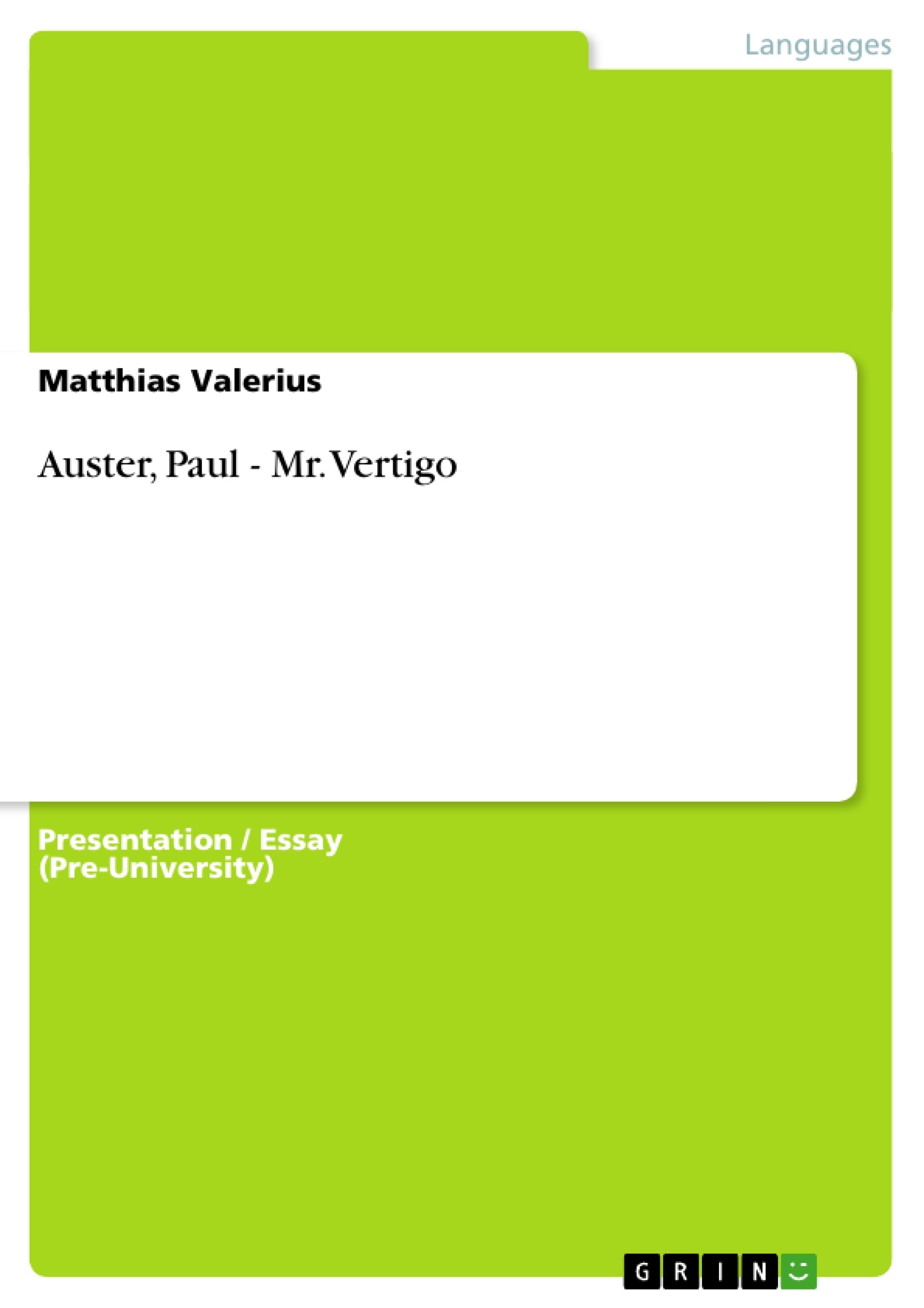Excerpt
Tuesday, 08 June 1999
Comment on Paul Auster’s novel“Mr. Vertigo”- amazon.com The way I got to know Paul Auster’s work is rather unusual. I did not come across one of his novels in a book shop, nor did somebody recommend his books to me. Instead, we were asked to read“Mr. Vertigo”by our English teacher!
We started discussing the novel in class. So I set about reading “Mr. Vertigo”with mixed feelings: on the one hand, I am a true bookworm and I’m used to reading a lot, but on the other hand reading a book because you’re toldto read it is a bit different. I don’t remember my expectations concerning the book (in fact, I didn’t know at all what to imagine and what to expect, as I had never heard of Paul Auster before, nor was I too experienced in American Literature). After all, I would never have thought of something likethat. In the course of the first few pages I realised that this book is reallyspecial. Maybe it is because I had expected something different that I got so absorbed by this book. I found the novel really captivating and couldn’t stop reading once that I had started. (Luckily, autumn holidays had just begun…) I’m afraid this sounds like a cliché, but that’s exactly what I experienced. Someone on this site wrote that the impact of a certain book hit him ‘like a ton of bricks’. I think that’s a nice image. I felt so, too.
Some have claimed that “Mr. Vertigo”isn’t a “true Auster”, or that some traditions built up in his earlier works (such as the famous “New York Trilogy”or “Moon Palace”) are thwarted, or abandoned. This statement appeared in several of the comments on this site, and I must say that I got quite annoyed because this or similar statements reoccurred many times throughout the whole list of comments.
Now that I’ve read several of Paul Auster’s earlier works (the above mentioned plus“Leviathan”) I agree with this view - to a certain degree (as far as the change of style, of atmosphere or of the person of the narrator is concerned) -, but nevertheless I don’t see this development as something negative or embarrassing. Most of Auster’s novels feature an adult as the narrator, but in the case of “Mr. Vertigo” large parts of the story are told from the view of a boy (in “Timbuktu”, the narrator is a dog!).
Those who became fond of Auster’s novels published in the late 1980’s or the early 90’s shouldn’t fail to read“Mr. Vertigo”, as well. Despite the differences there are lots of similarities between the two ‘phases’ of Auster’s writing - we should not forget that! For example, chance and coincidence play a similarly important role in “Mr. Vertigo” and in “Moon Palace”. Several recurring motifs appear in a number of his books, such as the motif of travelling and movement (Walt and Master Yehudi travelling all across the USA in their Wondermobile;
Peter Stillman walking all around New York City; Marco Stanley Fogg getting lost in Central Park,…).
Reading this novel in class was an experiment, I think (and I guess my teacher would agree). So perhaps I should describe the experience I made as a pupil.
Even as a German pupil, I didn’t have much difficulty reading the book - I’m not saying that all the words (US colloquial language, swearwords!) were easy to understand, but after all I was able to guess most of the unknown expressions from the context.
But, of course, reading the book wasn’t all we did! I must admit that working on the novel was great fun (to me), and I can’t remember having read such an amusing book in class before. (I’m not saying this because my English teacher might read this comment! It’s true!) We had just dealt with the concept of the American Dream in class, and after this we were able to pick out certain scenes, or situations, or motifs and compare them with the different aspects of the Dream. As the setting of the novel is quite realistic (I’m not talking about the flying scenes and the other fantastical elements), it was easy to concentrate on the historical background that is shining through in so many places, and to find out about the allegory between the USA and Walt’s life (the ‘ups’ and ‘downs’, his physical downfall on the day when the Great Depression started).
In short, the book is worth being discussed in school. Not only did it provide some interesting lessons, but it also proved to be good material for our A-level exams (I don’t have the results yet, but I liked the theme we were given for the four-hour written test; at least I liked it better thanShakespeare, perhaps because this one is more modern).
So if a German English class can treat this novel - why shouldn’t other groups, too?
It’s not an ordinary ‘school book’ - that’s what I liked most about it.
- Quote paper
- Matthias Valerius (Author), 1999, Auster, Paul - Mr. Vertigo, Munich, GRIN Verlag, https://www.grin.com/document/98835
Publish now - it's free






















Comments